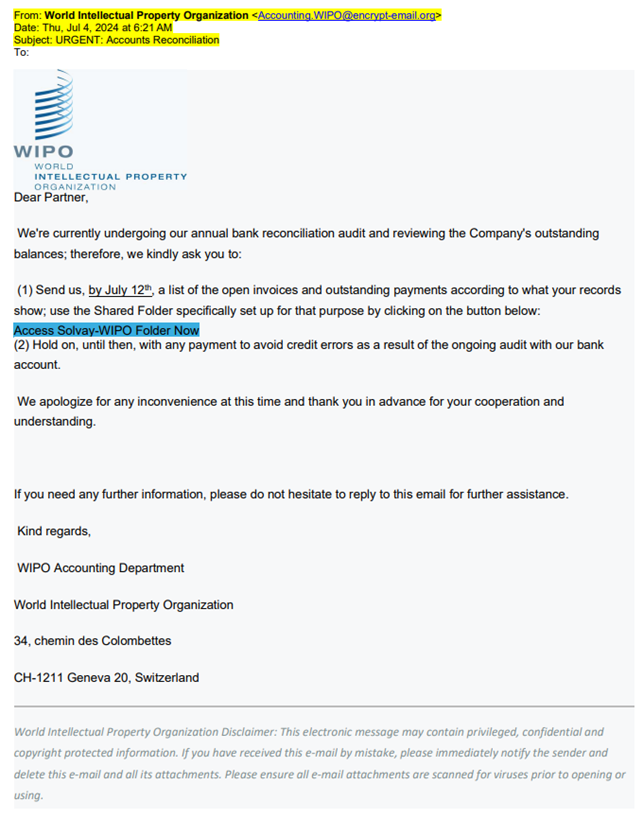Alerta de fraude - chamadas falsas, e-mails de phishing, solicitações de pagamento fraudulentas
Fique atento a possíveis tentativas de fraude por telefone, e-mail ou mensagem de texto.
Golpistas podem tentar roubar seu dinheiro ou informações pessoais (ou empresariais) enganando você e fazendo-o acreditar que a comunicação vem de nós. Para que as solicitações pareçam legítimas e provenientes de uma fonte oficial, os golpistas podem usar números de telefone e endereços de e-mail oficiais falsificados, sem qualquer conexão com a OMPI ou com qualquer dos nossos serviços.
Seguimos empenhados em aumentar a conscientização sobre esses esquemas fraudulentos e estamos trabalhando com os governos para tomar medidas contra os golpistas.
Como posso identificar um e-mail de phishing?
- Verifique o remetente: nossos endereços de e-mail usam o domínio “wipo.int”, mas você deve estar ciente de que endereços de e-mail também podem ser falsificados ou ligeiramente alterados para parecerem autênticos (por exemplo, wlpo.int)
- Analise o conteúdo: nossas comunicações não incluem “urgências” ou “ameaças” e somente solicitamos informações pessoais por meio de nossas plataformas oficiais (para a criação de uma conta na OMPI)
- Confira os links: passe o mouse sobre o link para ver se o URL tem a extensão “wipo.int” (ou upov.int)
Como posso detectar uma chamada falsa?
- Preste atenção às perguntas feitas: nossos funcionários nunca solicitam informações pessoais ou de pagamento por telefone. Não forneça esses dados a ninguém.
- Tenha em mente que as taxas cobradas pelos serviços da OMPI (PCT, Madri, Haia, Lisboa, AMC) devem ser pagas diretamente à Secretaria Internacional ou, conforme o caso, ao instituto nacional/regional de propriedade intelectual. Nenhum pagamento deve ser feito a serviços ou organizações de terceiros. Em caso de dúvida, entre em contato com a Secretaria Internacional.
How can I spot a phishing email?
- Check the sender: our email addresses have “wipo.int” domain. – however, be aware that email addresses can also be spoofed or impersonated (e.g. wlpo.int)
- Analyze the content: our language excludes “urgencies” and “threats”, and we will only request personal information through our official platforms (for the creation of a WIPO Account)
- Verify links: hover the link to see if the URL has “wipo.int” extension (or upov.int)
O que devo fazer se receber uma ligação ou e-mail fraudulento?
Se você receber algo que não esperava de nós e tiver dúvidas sobre a legitimidade do contato, não forneça nenhuma informação, não faça nenhum pagamento e não clique em nenhum link. Em vez disso:
- entre em contato com a nossa central de informações financeiras pelo telefone +41 22 338 77 44 para falar sobre o ocorrido, deixe uma mensagem, solicite um retorno de chamada ou fale conosco usando o Formulário de contato sobre questões financeiras
- consulte sua equipe de segurança da informação ou sua assessoria jurídica, conforme o caso
- confira as faturas relativas a pedidos de patente PCT ou faturas relativas ao Sistema de Madri em nosso site para ver se as notificações recebidas são semelhantes
- alerte todos os colegas que possam receber essas notificações
- faça uma denúncia às autoridades governamentais competentes e/ou aos grupos de proteção ao consumidor.
Aprenda mais sobre e-mails de phishing por meio de exemplos
Examine imagens que mostram o que identificar em um e-mail de phishing:
Mais exemplos de solicitações de pagamento fraudulentas que não vêm da OMPI podem ser encontrados nas páginas da web dedicadas:







